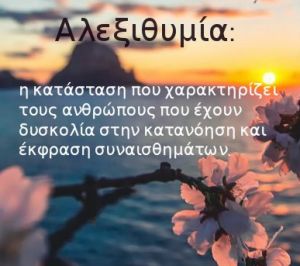Language/Modern-greek-1453/Culture/Alexithymia
Alexithymia is a personality trait which is characterized by difficulties recognizing and expressing one's own feelings. A failure in emotional awareness, social attachment, and interpersonal connections is the main feature of alexithymia, as described by the Greek phrase "no words for emotions," which approximately translates as "no words for feelings."
High levels of alexithymia are thought to affect 10% of the population, which can make it challenging to recognize and understand other people's emotions. This is supposed to cause emotionally unproductive and apathetic responses. People with alexithymia may report issues identifying their own feelings or having trouble expressing emotions that are judged socially acceptable, such as elation during joyful occasions. They may struggle with empathy and not express their feelings as strongly as their classmates, but they are not always apathetic.
For those with alexithymia, social situations might bring on emotions like rage, perplexity, difficulties "reading faces," discomfort, emptiness, elevated heart rate, lack of affection, or terror. Despite not being well-known, the ailment has been researched for more than 40 years and is frequently associated with another underlying neurological or mental health disorder.
The following social situations might be personally experienced by an individual with alexithymia: Anger, uncertainty, difficulties "reading faces," discomfort, loneliness, faster heartbeat, lack of affection, and panic
Author[edit source]
- Ευγενική χορηγία που στοχεύει να βοηθήσει μαθητές ή μη, απανταχού της Γης, που επιδίδονται στην εκμάθηση της ελληνικής γλώσσας!
- Contribution bénévole visant à aider les personnes, partout dans le monde, qui sont engagées dans l'apprentissage de la langue grecque !
- Voluntary contribution aimed at helping people, all over the world, who are committed to learning the Greek language!

